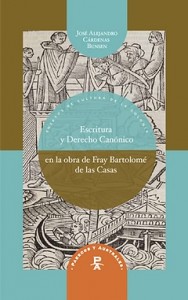I am thrilled to announce that José Alejandro Cárdenas Bunsen’s much-anticipated book on Las Casas is just about here! Well, not quite in the US yet. Its release date should be very soon. Cárdenas, who now teaches at Bucknell University, completed his dissertation a few years ago under the direction of Rolena Adorno at Yale. Taking up her suggestions, as well as Lewis Hanke, Brian Tierney, and Kenneth Pennington, that Las Casas was in fact deeply versed and knowledgeable of canon law, Cárdenas investigates the juristic categories and concepts underlying Las Casas’ writings. Furthermore, he identifies the influence of Las Casas on certain figures in the School of Salamanca. The book is entitled, Escritura y Derecho Canónico en la obra de fray Bartolomé de las Casas. If you belong to a university community, I heartily recommend you place a library order for it upon its release. I am not sure whether or not there will be an English edition to come out soon. Below I attach a copy of his dissertation abstract that appears to be the structure of his book:

My dissertation takes up the unexamined problem of the extent of the evidence of the canon law tradition in the works of Bartolomé de las Casas (1484-1566). I have sought to determine whether the relationship among his works can be charted on the basis of canon law (instead of civil law or theology, for example) as his disciplinary foundation. I have studied the body of canon law, the canonists’ commentaries that issued from it over the centuries, and major and minor works of the vast corpus of Las Casas’s works, which range over a fifty-year period (roughly, 1516-1566). I focus on Las Casas’s Historia de las Indias (1527-1561), his Apologética historia sumaria (1560), and the eight short treatises that he published in Seville in 1552. In chapter 1, I have recovered the implicit canonical categories that underlie Las Casas’ early memoriales and I have shown how they reveal the development of his ideas from the 1510s to the early 1540s. In chapter 2, I analyze his eight treatises from the viewpoint of jurisprudence and show how he supported his conclusions, and stressed their binding nature, by reference to the canon-law concepts of tyranny, war, slavery, possessio malae fidei , and restitution. I also identify the genre of the juridical gloss as the rhetorical and stylistic device upon which Las Casas conceptualized and organized the writing of his prose. In chapter 3, I demonstrate that Las Casas analyzed the events of history in relation to the precepts of the canon law tradition. In chapter 4 I link the Apologética historia sumaria to the juridical principles laid out in his Latin Apologia (1551) and indicate how the Apologética ‘s meditation on idolatry provides a major shift in the understanding of the legal consequences of this religious phenomenon. In the final chapter I examine the influence of Las Casas’ ideas on the works of sixteenth-century theologians and canon lawyers (Melchor Cano, Domingo de Soto, Bartolomé Carranza de Miranda and Juan de la Peña), who regularly, but often without attribution, incorporated Las Casas’s juridical proposals into their own works. Thus I demonstrate how Las Casas’ ideas, based on canon law principles, contributed to the formation of the communis opinio among Spanish intellectuals of his and the subsequent generation on the hotly contested affairs of the Indies.
A new era of Las Casas studies has arrived!